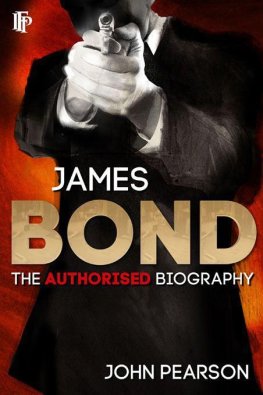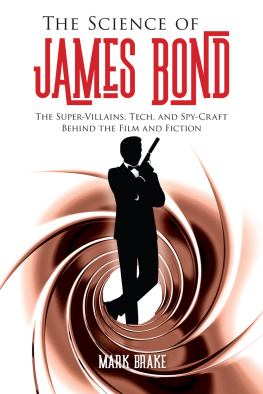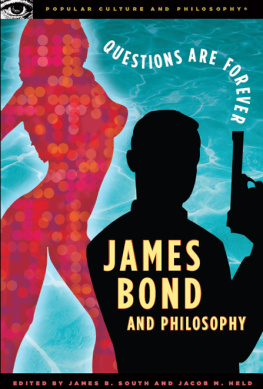THE MAN FROM BARBAROSSA
John Gardner

For Ed & Gretchen
who both know the realities
of living double lives for their country
No gravestone stands on Babi Yar;
Only coarse earth heaped roughly on the gash:
Such Dread comes over me.
Yevgeni Yevtushenko: Babi Yar
PRELUDE
BABI YAR
They came in an orderly fashion, the Jews of Kiev. They came anxiously though not really afraid not yet, for the notices posted around the city had simply said they were to be relocated. They came with what they could carry. They came in their hundreds, men, women and children. They came with hope. They came at peace with God. They came unprepared. They came, rightly as it turned out, with fear. They came to the corner of Melnik and Dekhtyarev Streets, just as they had been told.
Hitlers invasion of Soviet Russia, code-named Operation Barbarossa, had begun only three months, seven days earlier, on June 22nd, 1941, for it was now September 29th of that same year the year Stalin had disregarded all warnings of a Nazi invasion, believing it to be a trap set by England to promote bad feeling between Russia and Germany.
Ten days previously, the Twenty-Ninth Corps and the Sixth German Army had overrun the proud city of Kiev, capital of the Ukraine, known before the Revolution as Holy Kiev, for the city stood on the site of the first Russian Christian church.
Now the Jews came as they were bidden, allowed themselves to be organised into ordered rows and marched slowly along Melnik Street out towards the old Jewish cemetery and the bleak forbidding Babi Yar ravine.
The men who surrounded them were from Sonder-kommando 4a, comprising men of the SD and Sipo the Security Service and Security Police together with the third company of the Special Duties Waffen-SS battalion and a platoon of No. 9 Police Battalion, reinforced by Police Battalion No. 305 and units of the Ukrainian Auxiliary Police.
When they drew near to the ravine, the hordes of Jewish people were funnelled through barbed wire. They were made to hand over their valuables, then strip naked and advance towards the edge of the ravine in groups of ten.
Once there, they were gunned down by the SD, Sipo and SS units. There were cries of terror once the shooting began, but those detailed to send the people forward showed no mercy. They closed their ears to the hysterical screaming of the women and children, closed their eyes to the awful sights, closed their minds to everything except their duty. Like men who work in an abattoir, they dragged the children, mothers with babies, old men, weeping and praying stark naked towards the edge of the ravine.
When the day ended the bodies were covered with a thin layer of soil and the death squads went back to their barracks and extra rations of vodka.
For two days there was nothing but blood, shattered bone, riven flesh and the eternal yattering of the machine guns and when those two days were over, thirty-three thousand, seven hundred and seventy-one Jewish people had been murdered in that wild, desolate and horrible place. Those who visit the awful site today will swear they can hear the screams and pleading which, for forty-eight hours, filled the air, punctuated only by the rip of bullets.
The instigator of this fearful crime against humanity, SS-Standartenfhrer Paul Blobel, was sentenced to death in 1948. He was hanged at the Landsberg prison on June 8th, 1951. During the trial, much was said of Blobels deputy, SS-Unterscharfhrer Josif Vorontsov. He was the one, they said, who drove the men, women and children on towards their deaths, herding them in groups of ten to the ravine at Babi Yar.
What made Vorontsovs crime more heinous was that he was a Ukrainian who, in 1941, during the early stages of Operation Barbarossa, surrendered to the SS and became one of the many foreign recruits serving with the Waffen-SS Special Duties Brigade. Once the war ended, many organisations and individuals searched for traces of the man, but found little. It was known that he had, at one point, sometime in the summer of 1942, served under the infamous SS Commandant Franz Reichsleinter at the Polish extermination camp near the town of Sobibr, where many hundreds of thousands of Jews were sent to the gas chambers.
When the Polish underground finally brought about an insurrection at Sobibr, Josif Vorontsov evaded capture. Years later, in 1965, during the investigation of eleven SS officers who had served at the camp, more information came to light concerning the Ukrainian turncoat. There were even hints that he had escaped to North America with the help of Spinne or Odessa, the groups that proved so adept at transforming former SS officers into blameless citizens. There were, however, no hard facts.
His name went on to the lists of wanted war criminals, but he was never found. Nothing more was heard of Josif Vorontsov until December 1990.
1
HAWTHORNE
The town of Hawthorne, New Jersey, is less than one hours drive from the centre of Manhattan, yet a stranger, dropped there by some magic, could be forgiven for imagining that he was in a small English North Country town.
True, the main road is wider than any you will find in Lancashire, Yorkshire, or Tyne and Wear, but the terraced brick houses have that same look you see in some of the hardy uncompromising communities around, say, Bolton or Blackburn. The overhead power lines and traffic lights signal that you are in America, but the feel of the place is strangely similar to the English North.
One of Hawthornes favourite eating places is a single-storey Italian restaurant called Ossies, named after its proprietor. On most nights it is full, and the tall dark figure of Ossie threads his way through the tables, taking orders, engaging in banter with his regulars and providing what he, and his clients, believe to be the best Italian food in the whole of the United States.
On Wednesday December 26th, 1990, he greeted one of his most stalwart customers with a sympathetic, almost compassionate smile, for old Joel Penderek ate at Ossies on at least four nights of the week. Before the previous September, Joe, as he was generally known, had only been a weekly visitor together with his wife Anna. But Anna, who was never known to have had a days illness, had died with a suddenness which shattered old Joes happy and ordered life, on the previous Labor Day. There, baking and chattering one minute, and dead the next. The doctor said it was a massive heart attack and that he had already warned Anna several times that she carried too much weight and her cholesterol level was way above the acceptable norm.
This helped old Joe Penderek not a jot. He had met, and fallen in love with Anna, on the boat in 1946, and had married her as soon as they both knew they had been accepted by the immigration authorities.
Joe was twenty-nine years old when he came to America, Anna was twenty-seven and they both acknowledged that they were among the lucky ones. They seldom talked about their experiences in Europe, but those who spent any time with them knew they were Russian Jews who had been saved from one of the Nazi extermination camps, spending several months in one of the Allied DP centres before being passed on, via a compassionate American major, and swallowed by a group of assorted survivors earmarked for the USA. Anna had told her neighbour, Debbie Mansell, that all her family who had escaped death had been sent back to Russia where they disappeared. Joels relatives had all died in the camps. It was wicked and cruel, but who said life would be fair?
Within a year of their marriage, Joe, who, until then, had kept them both by taking casual labour, landed a good job with a local construction company, and, as the years passed, so he had risen, from labourer to foreman, from foreman to site manager, and from site manager to retirement with a healthy pension. Now he had become a sad, lost figure who preferred his own company, as though some inner pride dictated that a man should be able to exist alone, and in his own private environment, once his lifes partner had gone for ever.
Next page














